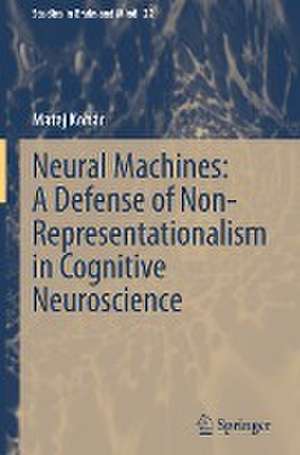Neural Machines: A Defense of Non-Representationalism in Cognitive Neuroscience: Studies in Brain and Mind, cartea 22
Autor Matej Koháren Limba Engleză Hardback – 10 mar 2023
Kohar begins with an introduction to the mechanistic theory of explanation, focusing on the analysis of mechanistic constitution as the basis of explanatory relevance in constitutive mechanistic explanation. He argues that any viable analysis of representational contents implies that content is not constitutively relevant to cognitive phenomena. The author also addresses objections against his argument and concludes with an examination of the consequences of his account for both traditional cognitive neuroscience and non-representationalist alternatives. This book is of interest to readers in philosophy of mind, cognitive science and neuroscience.
| Toate formatele și edițiile | Preț | Express |
|---|---|---|
| Paperback (1) | 575.38 lei 38-44 zile | |
| Springer International Publishing – 10 mar 2024 | 575.38 lei 38-44 zile | |
| Hardback (1) | 698.80 lei 43-57 zile | |
| Springer International Publishing – 10 mar 2023 | 698.80 lei 43-57 zile |
Din seria Studies in Brain and Mind
-
 Preț: 391.22 lei
Preț: 391.22 lei - 15%
 Preț: 645.96 lei
Preț: 645.96 lei - 15%
 Preț: 583.61 lei
Preț: 583.61 lei - 24%
 Preț: 686.50 lei
Preț: 686.50 lei - 15%
 Preț: 699.77 lei
Preț: 699.77 lei - 15%
 Preț: 707.96 lei
Preț: 707.96 lei - 15%
 Preț: 645.47 lei
Preț: 645.47 lei - 15%
 Preț: 643.99 lei
Preț: 643.99 lei -
 Preț: 390.08 lei
Preț: 390.08 lei - 20%
 Preț: 554.04 lei
Preț: 554.04 lei - 15%
 Preț: 578.05 lei
Preț: 578.05 lei - 18%
 Preț: 791.40 lei
Preț: 791.40 lei - 18%
 Preț: 777.03 lei
Preț: 777.03 lei - 15%
 Preț: 646.94 lei
Preț: 646.94 lei - 15%
 Preț: 691.91 lei
Preț: 691.91 lei - 15%
 Preț: 641.85 lei
Preț: 641.85 lei - 18%
 Preț: 1118.45 lei
Preț: 1118.45 lei - 15%
 Preț: 639.25 lei
Preț: 639.25 lei - 15%
 Preț: 662.80 lei
Preț: 662.80 lei -
 Preț: 392.21 lei
Preț: 392.21 lei -
 Preț: 394.71 lei
Preț: 394.71 lei -
 Preț: 394.51 lei
Preț: 394.51 lei
Preț: 698.80 lei
Preț vechi: 822.12 lei
-15% Nou
Puncte Express: 1048
Preț estimativ în valută:
133.73€ • 138.77$ • 111.78£
133.73€ • 138.77$ • 111.78£
Carte tipărită la comandă
Livrare economică 17-31 martie
Preluare comenzi: 021 569.72.76
Specificații
ISBN-13: 9783031267451
ISBN-10: 3031267451
Pagini: 198
Ilustrații: IX, 198 p. 1 illus.
Dimensiuni: 155 x 235 mm
Greutate: 0.47 kg
Ediția:2023
Editura: Springer International Publishing
Colecția Springer
Seria Studies in Brain and Mind
Locul publicării:Cham, Switzerland
ISBN-10: 3031267451
Pagini: 198
Ilustrații: IX, 198 p. 1 illus.
Dimensiuni: 155 x 235 mm
Greutate: 0.47 kg
Ediția:2023
Editura: Springer International Publishing
Colecția Springer
Seria Studies in Brain and Mind
Locul publicării:Cham, Switzerland
Cuprins
Introduction.- Part 1. Mechanisms.- Chapter 1. The New Mechanistic Theory of Explanation: a primer.- Chapter 2. Mechanistic explanatory texts.- Part 2. Representations.- Chapter 3. Representations and mechanisms do not mix.- Chapter 4. Indicator contents.- Chapter 5. Structural contents.- Chapter 6. Teleosemantics.- Part 3. Objections.- Chapter 7. The dual-explananda defence.- Chapter 8. The Pragmatic Necessity defence.- Part 4. Applications.- Chapter 9. Applications and future directions.- Conclusion.
Notă biografică
Matej Kohar is Research Assistant at the Technical University in Berlin, Germany. He earned a BA in Philosophy from the University of Exeter, an MSc in Mind, Language and Embodied Cognition from The University of Edinburgh and has defended a doctoral thesis in Philosophy at the Ruhr-University Bochum in October 2020.
Textul de pe ultima copertă
In this book, Matej Kohar demonstrates how the new mechanistic account of explanation can be used to support a non-representationalist view of explanations in cognitive neuroscience, and therefore can bring new conceptual tools to the non-representationalist arsenal. Kohar focuses on the explanatory relevance of representational content in constitutive mechanistic explanations typical in cognitive neuroscience. The work significantly contributes to two areas of literature: 1) the debate between representationalism and non-representationalism, and 2) the literature on mechanistic explanation.
Kohar begins with an introduction to the mechanistic theory of explanation, focusing on the analysis of mechanistic constitution as the basis of explanatory relevance in constitutive mechanistic explanation. He argues that any viable analysis of representational contents implies that content is not constitutively relevant to cognitive phenomena. The author also addresses objections against his argument and concludes with an examination of the consequences of his account for both traditional cognitive neuroscience and non-representationalist alternatives. This book is of interest to readers in philosophy of mind, cognitive science and neuroscience.
Caracteristici
Presents a novel defense of non-representationalism Synthesizes mechanistic explanation with non-representationalism Furthers the debate between representationalism and non-representationalism
